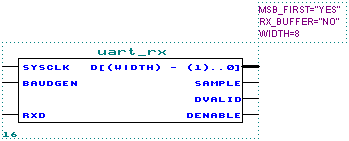
FreeCore Function #3:
Compact UART, Receiver
Module
Module name:
cuart_rx
Current release: version 1.0, April 4,
1997
Contributed by: Rune Baeverrud
The Compact UART will give you UART (Universal Asynchronous Receiver Transmitter) functionality with a minimum of space requirements. The Compact UART is fully LPM parameterizable and will never waste space on unused functionality. With the Compart UART, you may build UARTs of any word length. How about a 49-bit UART with 7 stop bits? With Compact UART, that is your decision.
Shown below is a sample schematic using the cuart_rx module:

The receiver module is here combined with the div_by_n module, also found in the FreeCore Library. Data is sent out with a speed of 66MHz/859/8 = 9600bps. For lower data speeds, I recommend using several cascaded div_by_n modules to avoid high counter values, which is a possible bottleneck.
Interfacing to cuart_rx is very straight-forward, and the description of the pins and parameters are given below. A reference design using the transmitter and receiver module, and combining them with a microprocessor interface, is also available in the FreeCore Library.

| PARAMETERS | |
| MSB_FIRST | Determines whether MSB or LSB in the data stream is expected first. Default is "YES", indicating that MSB is expected first. |
| RX_BUFFER | May be "YES" or "NO". If the parameter value is set to "YES", the Receiver Module will be double-buffered. A value of "YES" will also consume more logic cells. Default value is "NO". |
| WIDTH | Data Width. The data width may be any number equal to or larger than 2. |
| INPUT PORTS | |
| SysClk | System clock input. |
| BaudGen | Baud rate generator input. Required to be 8 times the actual data rate. |
| RxD | Serial data input. |
| OUTPUT PORTS | |
| D[] | Parallel data output. |
| Sample | Goes to 1 for one system clock cycle each time RxD is sampled. |
| DValid | If 1, it indicates that a valid data value (last data word received) is present on the Dout[] output. DValid goes to 1 at the same time as data is presented on the D[] output, and goes to 0 one clock period before D[] is changed. |
| DEnable | Goes to 1 for one system clock cycle each time valid data is presented on the D[] output. |
![]()
Last updated 08 Feb 2001 12:29